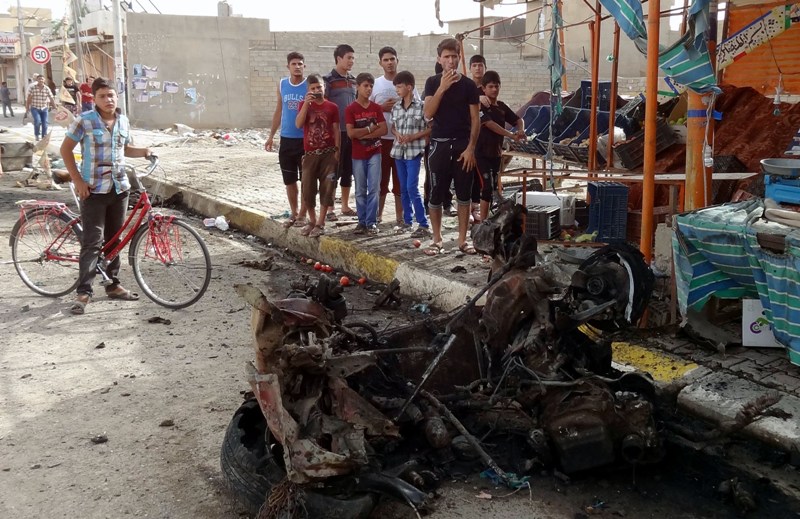BAGHDAD – A series of car bombs exploded across Iraq’s capital Saturday night, killing at least 52 people in a day of violence that saw militants storm a university in the country’s restive Anbar province and take dozens hostage, authorities said.

The attacks in Baghdad largely focused on Shiite neighbourhoods, underscoring the sectarian violence now striking at Iraq years after a similar wave nearly tore the country apart following the U.S.-led invasion that toppled Saddam Hussein. Now with U.S. troops gone, Iraq founds itself fighting on fronts across the country, as separate clashes in a northern city killed 21 police officers and 38 militants, officials said.
WATCH: Aftermath of deadly bombing in Iraq
The first Baghdad attack took place Saturday night in the capital’s western Baiyaa district, killing nine people and wounding 22, police said. Later on, seven car bombs in different parts of Baghdad killed at least 41 people and wounded 62, police said. A roadside bomb in western Baghdad also killed two people and wounded six, police said. All the attacks happened in a one-hour period and largely targeted commercial streets in Shiite neighbourhoods, authorities said.
Hospital officials confirmed the casualty figures. All officials spoke on condition of anonymity because they were not authorized to release details to journalists.
The day began with militants killing three police officers on guard at the gates of Anbar University, a police and a military official said. Islamic extremists and other anti-government militias have held parts of Anbar’s nearby provincial capital of Ramadi and the city of Fallujah since December amid rising tensions between Sunni Muslims and the Shiite-led government in Baghdad.
The gunmen detained dozens of students inside a university dorm during their attack, the officials said. Sabah Karhout, the head of Anbar’s provincial council, told journalists that hundreds of students were inside the university compound when the attack started at the school. Anbar University says it has more than 10,000 students, making it one of the country’s largest.
READ MORE: Iraqi PM’s bloc wins most parliamentary seats
Ahmed al-Mehamdi, a student who was taken hostage, said he awoke to the crackle of gunfire, looked out the window and saw armed men dressed in black running across the campus. Minutes later, the gunmen entered the dormitory and ordered everybody to stay in their rooms while taking others away, he said.
The Shiite students at the school were terrified, al-Mehamdi said, as the gunmen identified themselves as belonging to an al-Qaida splinter group known as the Islamic State of Iraq and the Levant. The Sunni terror group, fighting in Syria with other rebels trying to topple President Bashar Assad, is known for massive, bloody attacks in Iraq as well often targeting Shiites that they view as heretics.
The Islamic State did not immediately claim the attack on the school.
Several hours later, gunmen left the university under unclear circumstances. Students then boarded buses provided by the local government to flee the school, though gunfire erupted as security forces attacked retreating militants, police said.
“We thank God that this crisis ended almost peacefully and no student was hurt as far as I know,” al-Mehamdi said.
Security officials said authorities wanted to wait for bomb disposal experts before entering any building on campus out of fears that the fleeing gunmen planted explosives. Government forces also came under sniper fire, officials said.
“Not a single student or a university staff member was hurt during the raid. All of them went home and their ordeal is over,” Karhout said.
Meanwhile in the northern city of Mosul, clashes continued Saturday for a second day between security forces and Sunni militants trying to seize neighbourhoods there. Police and morgue officials said that fighting since dawn Saturday killed 21 police officers and 38 militants.
Al-Qaida-linked fighters and their allies seized Fallujah and parts of Ramadi in late December after authorities dismantled a protest camp of Sunnis angry at what they consider their second-class treatment by the Shiite-led government. Fearful of setting off violence, security forces withdrew from the area, allowing militants to seize the cities. In April 2013, a similar dismantling of a Sunni protest camp in Hawija sparked violent clashes and set off the current upsurge in killing.
The government and its tribal allies are besieging the rebel-held areas, with fighting reported daily. Tens of thousands have fled the violence.



Comments